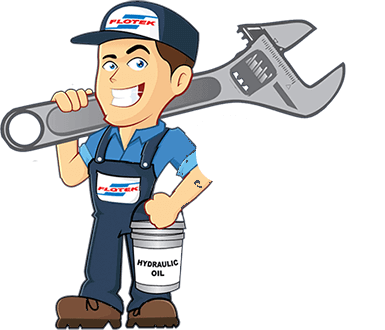3 Ways to Know If Your Hydraulic System is In Trouble

Do you know how to spot hydraulic system problems before they escalate? Hydraulic systems are complicated and require the skills of a professional. If you suspect that your hydraulic system has an issue, there are some warning signs that can help you determine whether or not it’s time for a mechanic. Here are 4 ways to know if your hydraulic system is in trouble.
1) HYDRAULIC FLUID LEAKS OUT OF PLACES WHERE IT SHOULDN’T BE LEAKING.
Hydraulic fluid is an oil, so ignoring a leak can lead to serious damage. If you notice that there are drips of hydraulic fluid on the ground under your machine or vehicle, call in a mechanic immediately. Ignoring even small leaks will cause more major problems over time as oil seeps into other parts and corrodes them because it isn’t. Leakage can also be due to poor system design, incorrect component selection, poor manufacturing tolerances during a component’s construction, or incorrect overhauls. Hydraulic system leakage can present itself in a variety of forms. Hydraulic fluid will damage other parts if it leaks from one part to another so always have your hydraulic system repaired when you notice any kind of leak. In order to avoid small and large problems, be sure that Hydraulic fluid should never be leaking out of any part of your machine, so it’s time for a mechanic if there is.
2) HYDRAULIC OIL SMELLS BURNT
If the hydraulic oil darkens, smells burnt, and varnish and/or sludge forms, this indicates oxidative degradation of the oil. The other form of oxidative degradation of the oil, or “normal” oxidative degradation if you like, is accelerated by high bulk oil temperature in the presence of air. This is known as “thermal degradation.” Thermal degradation also produces sludge and varnish.
In some cases, overheating the engine oil will darken it, give it a burnt odor, cause sludge or varnish to form, and allow air into the system by pumping fluid out of it. Due to increased bulk-oil temperature in the presence of oxygen, oxidation is accelerated due to greater bulk-oil temperature.
3) Hydraulic pump sounds louder than usual
The pump’s suction line isn’t have enough water flowing through it. Cavitation is often the result of a blockage. A noisy hydraulic pump may be caused by a problem with one of its components or connections. A faulty or failing pressure control, bearing, valve, seal, or coupling could cause an unusual sound you haven’t heard before. Hydraulic pumps and motors can create a high-pitched whine or loud chattering noise if the impeller is hitting the casing. Hydraulic fluid that’s contaminated with water can cause rusting inside of an electric motor, which will make it noisy – even though there may be fewer metal parts touching than usual.
3) HYDRAULIC FLUID PRESSURE FEELS ABNORMAL WHEN DRIVING OVER BUMPS
A rattling, vibrating, or squeaking sound comes from the wheels when you drive over a speed bump or pothole. Hydraulic fluid cannot be compressed, so the only thing that can make hydraulic systems run noisily is air or dirt in the system. Hydraulic pumps and motors are also very strong, which means they’re capable of running through an undesirable amount of contaminants without too much trouble. It could indicate that something unusual is occurring in the front of your vehicle. Apart from your engine, you have a suspension system with numerous components that may rattle, especially if you have poor bushings.
Noise is not an unusual thing, it’s only that you should take the noise very seriously if it occurs in your vehicle. Hydraulic fluid can be used to grease up components inside the car, but when this liquid becomes contaminated with dirt or air bubbles, all kinds of problems usually occur.
Knowing all these Hydraulic Fault Finding signs will help you to detect a Hydraulic System problem as soon as possible. It will help you know what services you need the most. Having the right, trusted and experienced services provider will help you have the most Hydraulic System repairs or Hydraulic Systems services that can be done.



